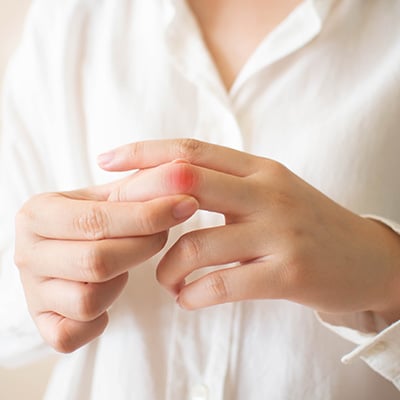Are Gut Bacteria Responsible for Your Lupus?
Fatigue, muscle and joint pain, facial rashes, and the list goes on and on.
The daily, weekly, or monthly struggles of someone who suffers from Lupus are endless.
The symptoms may seem to be the worst part to an outsider.
But, inside the struggle of not knowing how you got it or why you can’t control it or get it to go away can be even more frustrating.
However, all hope isn’t lost.
The place you least expected to be able to control your demon from may actually be the precisely where you can defeat it — inside your gut.
What is Lupus?
Lupus is a systemic autoimmune disorder.
As with any other autoimmune disorder, lupus makes your body attack itself.
Instead of just targeting what it’s supposed to, like viruses and bacteria, it attacks your healthy tissues as well.
Feeling confused?
You aren’t alone. If doctors don’t fully understand it, you shouldn’t be expected to either.
What we do know about lupus is that there are several different types and it seems to affect each individual differently.
We will be mainly talking about systemic lupus erythematosus (SLE) since it is the most common form and most highly studied.
With SLE pretty much any system, in most cases, several systems will be attacked.
The main body parts affected include your:
- Brain
- Kidneys
- Lungs
- Heart
- Skin (especially on your face)
- Joints
How Do You Get Lupus?
The exact cause of lupus is unknown.
Since it doesn’t have a specific test to diagnose it, some cases can be misdiagnosed for years before finding out it was lupus all along.
Generally, family history, bloodwork, and other lab tests can lead to a positive lupus diagnosis.
Genes are suspected to play a large role in SLE but genes alone can’t explain all cases. Some other factors suspected to play a role in SLE development include:
- Environmental factors
- Nutritional deficiencies
- Antibiotic use
- Gut dysbiosis
How Gut Microbes Can Influence Lupus
Gut dysbiosis is an imbalance of the different bacterial strains living in the wonderfully complex world that is your gut microbiome.
These trillions of bacteria affect everything from your digestion capabilities to your moods to your body’s chemical balances.
If they can control all of this, it’s really no surprise that they can alter your state of health as well.
Most diseases have been able to be traced back to some type of bacterial imbalance in the gut.
This goes for autoimmune disorders, like lupus, as well.
Bacterial Strains That Affect Lupus
Bacterial ratios make a huge difference in your health.
By having a large diversity in bacterial strains, your body is healthier and functions more properly.
Bacteroidetes and Firmicutes
One of the biggest indicators of a microbiome in dysfunction is an abnormal ratio of Bacteroidetes to Firmicutes.
Usually, with this ratio, you’ll want to see a good balance of the two. When one seriously outnumbers the other, like in the case with SLE patients, you are at a higher risk to experience diseases.
One study found that SLE patients had a much higher amount of Bacterioidetes to Firmicutes. This same study found that they were much lower levels than the control group. The mixture of dysbiosis and low bacterial diversity is being linked to SLE.
Ruminococcus gnavus (RG)
Along with having a low microbial diversity in their digestive tracts, SLE patients were also found to have a substantially higher amount of Ruminococcus gnavus bacteria in their stool.
There was actually a five-fold difference in the representation of RG in patients with SLE than the healthy controls.
RG levels also differed depending on whether patients were in remission or a current flare up.
This being a clear indication that higher representations of this bacteria mean worse SLE symptoms.
Lactobacillus reuteri (L.reuteri)
- reuteri is a difficult strain to understand when it comes to SLE. Generally speaking, Lactobacillus strains are actually good for your health.
When picking yogurt or probiotic supplements to take, you’re usually going to look for different Lactobacillus strains.
This actually isn’t the case when it comes to SLE.
- reuteri worsened symptoms during a flare-up for SLE patients. This study also found that by eating resistant starches your body can produce specific short-chained fatty acids that help to balance L. reuteri levels in your body and calm down an SLE flare-up.
How to Improve Lupus Through Your Gut
Since lupus and diseases that are similar don’t have an exact known cause, completely recovering from them isn’t something you should expect. However there are some things you can do to help alleviate symptoms.
Vitamin D
Since most people suffering from SLE are sensitive to sunlight, they probably aren’t getting anywhere near enough vitamin D.
Most people, even those who don’t have SLE don’t get enough vitamin D through sunlight and their diet. Vitamin D deficiencies have been linked to many diseases whether as a symptom or a cause.
Check with your doctor before starting supplementation, but vitamin D supplementation can help with energy and reducing the severity of lupus flares.
Vitamin A
Again this is something you should definitely check with your doctor on before supplementation, but vitamin A deficiencies are also very common in SLE patients.
Vitamin A levels that get too high can be very dangerous though, so checking with your doctor is extremely important.
Omega 3 Fatty Acids
Omega 3’s were found to be better for helping SLE than Omega 6.
Omega 3 supplements that had higher DHA than EPA levels were much more successful at calming down symptoms.
Those who suffer from lupus and cardiovascular related diseases should definitely consider adding a DHA-rich Omega 3 supplement into their daily routine (under doctor approval, of course).
Resistant Starches
As stated above, resistant starches were found to help reduce lupus flare symptoms through gut modulation.
Since resistant starches are harder for your body to break down, they must be fermented which helps to release more helpful products for your body to use.
This helps to balance bacteria in your gut and heal different parts of your body depending on what properties the specific starch you’re eating contains.
Just because you or a loved one suffers from this terrible disorder, doesn’t mean all hope is lost.
Making sure to keep as healthy of a lifestyle as you can will help to reduce the severity of your lupus symptoms.
As with all autoimmune disorders, it can be hard when you feel like you are doing everything right but still have bad days. Make sure you have a strong support system, a great team of doctors, and some healthy ways to relieve stress and frustration.
Don’t be afraid to reach out if you need help.
This isn’t something you have to fight alone.
